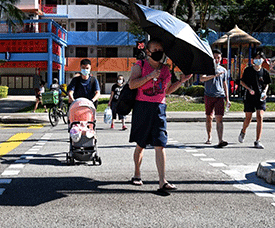S’pore at risk of heatwaves, more dengue outbreaks as climate change worsens health woes: Report
SINGAPORE (The Straits Times/ANN) -- Health problems caused by climate change, such as heat stress and mosquito-borne diseases, will continue to worsen unless countries do more to slash planet-warming emissions, a global group of researchers has warned.
In 2020, seniors over age 65 were collectively affected by 3.1 billion more days of heatwave exposure compared with the average figure between 1986 and 2005, according to top journal Lancet’s sixth report on the links between health and climate.
 |
| Singapore, already a highly hot and humid nation, is expected to become hotter in the coming decades as the planet continues heating up. --Photo ST Kua Chee Siong |
Over 90 researchers, including two from Singapore, from various institutions and United Nations agencies contributed to the new Lancet Countdown report.
They tracked 44 indicators of health impacts that are directly linked to climate change, from the lethality of extreme weather events to food security scares.
One of the Singapore scientists, Associate Professor Jason Lee from the National University of Singapore’s Yong Loo Lin School of Medicine, contributed to a new indicator that assessed the links between heat and exercise.
He and his team found that over the past few decades globally, the number of hours and days of scorching temperatures - making it unsafe to exercise - has increased.
Dr Samuel H. Gunther, Prof Lee’s research fellow from the same school who also worked on the report, explained: “By analysing the past three decades’ worth of global climate and population records, Prof (Lee) and I found that tropical countries lost nearly five hours of daily physical activity per person in 2020.”
Prof Lee, who is also the deputy director of the human potential translational research programme, added: “When heat curbs our exercise opportunities, it will increase our health costs.”
The report also stressed that key health trends are getting worse and exacerbating existing health and social inequities, especially in poorer nations.
“The toll on human health (is) hardest hitting to those people living in low-income countries, whose populations have made the smallest relative contribution to climate change,” the Lancet said in a statement on Thursday (October 21).
“The Lancet Countdown report shows that many countries are under-prepared for the health effects of climate change.”
The researchers are among other healthcare professionals who are pinning their hopes on the United Nations’ climate change conference in Glasgow that will begin in 10 days.
The conference aims to finalise details that will help nations implement the 2015 Paris Agreement, under which nations make pledges to limit global warming to well below 2 deg C, preferably to 1.5 deg C, compared with pre-industrial levels. This threshold will limit the worst impacts to the planet and people. The report also stated that countries that are ranked high or very high on the human development index, like Singapore, are most vulnerable to increased dengue outbreaks and heat extremes. Warmer weather allows the Aedes mosquito to breed faster.
The number of dengue cases has exceeded 4,400 this year, with more than 100 cases per week since September 19, said the National Environment Agency in a Facebook post last week.
At the same time, 2021 saw the rise of a locally rare dengue virus type, called DenV-3. As Singapore has not seen a DenV-3 outbreak in 30 years, population immunity against the virus type is low. DenV-3 has been detected in two large clusters since September, said NEA.
(Latest Update October 25, 2021)
|